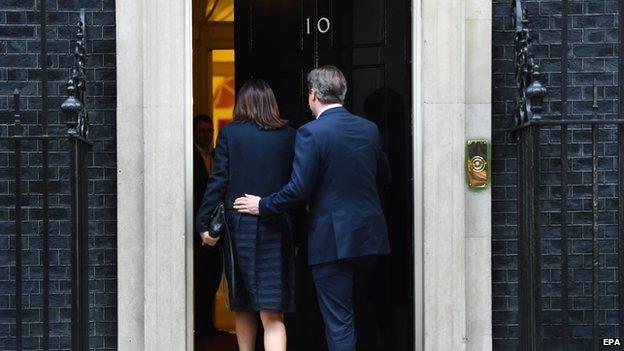GE2015 and the economy
- Published
- comments

Sterling is up (the most for seven years against the euro), share prices are up (especially bank shares like Lloyds and RBS, and energy shares such as Centrica), government bond prices are up.
To state the obvious, investors love the Tories' general election victory.
There are a few reasons.
One (no surprise here) is that Labour's threat of breaking up banks and imposing energy price caps has been lifted.
Second is that investors have been discounting days and weeks of wrangling after polling day over who would form the government - and so they are semi-euphoric that we already know who's in charge.
Third, many investors tend to be economically conservative and instinctively Conservative.
But although the City may be a bit drunk on the result, its pleasure in Ed Miliband's and Ed Balls' humiliation may be making it a bit blind - perhaps dangerously so - to some bumps in the economic road ahead.
The first thing to note is that England and Scotland have voted for diametrically opposed economic policies.
If there was one policy associated with the Tories it was further deep spending and welfare cuts to generate a budget surplus.
If there was one policy associated with the Scottish National Party it was an end to deep spending and welfare cuts.
Which means that if the integrity of the United Kingdom is to be sustained, somehow a way has to be found - and presumably fairly fast - to reconcile the English vote for more austerity and the Scottish vote for an end to austerity.
And this would have to be done in a way that doesn't reinforce the view of millions of English citizens that they are subsidising feather-bedded Scottish public services.
The transfer of more economic decision-making powers to Edinburgh also has to be done in a way that doesn't split the ruling Tory party.
Which takes us to the second important uncertainty of this apparently certain result - which is whether Tory MPs will be more or less united than in the current parliament.
Strikingly, the eurosceptic, nationalist and more socially conservative right of the Tory party has been remarkably loyal to David Cameron over the past few years - partly because they could see that in a coalition party discipline was vital to governing and staying in office.
But the trouncing of the Liberal Democrats means that Tory MPs no longer have to be on their best behaviour - they no longer have to be careful not to alienate coalition partners with their words and deeds.
So David Cameron could live to regret his electoral dream come true, what looks set to be a slim overall majority in the Commons.
Or to put it another way, the new Tory government may not turn out to be a unified, strong government, of the sort that investors prefer. And that is partly because the Fixed Term Parliament Act means there can be endless backbench rebellions that do not come anywhere near to tipping the government out of office.
Apart from anything else, David Cameron will now be under enormous pressure from many of his MPs, alarmed by UKIP's success in taking votes - if not seats - to claw back much more sovereignty from Brussels than is realistic, as a precursor to the the promised referendum on EU membership.
Or to put it another way, the UK's continued membership of the EU is today more uncertain than it has ever been - and many investors and those who run big multinationals will hate that.